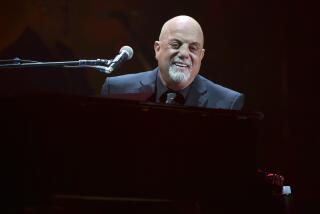Review: At 69, André Watts is playing like a teenage phenom
In a stunning recital at the Broad Stage in Santa Monica, pianist André Watts defied the passage of time Sunday by recalling his younger self, the 16-year-old who became an overnight sensation in 1963 after performing Liszt’s E-flat Concerto with Leonard Bernstein on national television.
Watts, who turns 70 in June, tailored his fiery Romantic temperament to a thoughtful program of Mozart, Schubert, Chopin and Liszt, demonstrating the young virtuoso in him is alive and well but tamed by an expressive and mature artist. Throughout his recital, Watts achieved a level of authority and command seldom heard from a pianist of any age.
The white-haired Watts began with Mozart’s haunting Rondo in A minor (K.511), conveying the score’s melancholy mood and handling its ornamentation and gently lilting song-like quality with finely articulated elegance. When the rondo’s interlude took a touching Schubert-like turn from minor to A major, it became just one example of how Watts’ program would begin to take shape as a beautiful, intricately woven tapestry.
Watts’ tempered virtuosity in the first of Schubert’s three Piano Pieces (D.946), offered lovely cantabile playing in the slower sections of the Allegro assai, linking the composer’s sound world to Mozart’s operatic one. Similarly, Watts conveyed lyricism and high drama in the set’s turbulent central Allegretto. The pianist’s near-symphonic sound production in the final Allegro prepared the rapt audience for what followed — a magisterial rendition of Schubert’s early Romantic era “Wanderer” Fantasy.
In the four sections of “Wanderer,” performed without pause, Watts’ octave playing, finger strength and wrist technique proved undiminished. Without sacrificing the piece’s poetry or blurring its scales and other clusters of notes during the near-terrifying momentum he generated, Watts probed the score’s breathtaking architectural sophistication. Every part fit together. The pianist did not hold back, nor did he push too far. Watts’ open, unmannered playing summoned Arthur Rubinstein at his noble, thrilling best.
After intermission, Watts gave a similarly well-judged and powerful reading of Chopin’s seminal Ballade No. 1 in G minor, followed by a lovely performance of Liszt’s Concert Etude No. 3, “Un Sospiro.” Watts then turned to an evocative clutch of late works by the composer, including “Nuages Gris” (Grey Clouds) and “Schlaflos, Frage und Antwort” (Sleepless, Question and Answer).
Liszt biographer Alan Walker posited “Nuages Gris” as a “gateway to modern music.” Indeed, Watts’ fascinating account of the posthumously published 1881 score conjured a proto-Debussy, even Schoenberg-like, atmosphere of stark desolation. A similar pared-down economy marked “Schlaflos,” which ended by vanishing under Watts’ hands, seemingly in midair.
Watts, a Lisztian par excellence, concluded with a riveting account of the composer’s extroverted Transcendental Etude No. 10. But the recital’s compelling mood of melancholy reemerged in a single encore: Chopin’s gorgeously somber Nocturne (op. 27, no. 1), in which Watts’ restless, mysterious rendition came full circle, back to the spirit of Mozart’s contemplative Rondo that had opened the program.
Follow The Times’ arts team @culturemonster.
More to Read
The biggest entertainment stories
Get our big stories about Hollywood, film, television, music, arts, culture and more right in your inbox as soon as they publish.
You may occasionally receive promotional content from the Los Angeles Times.






